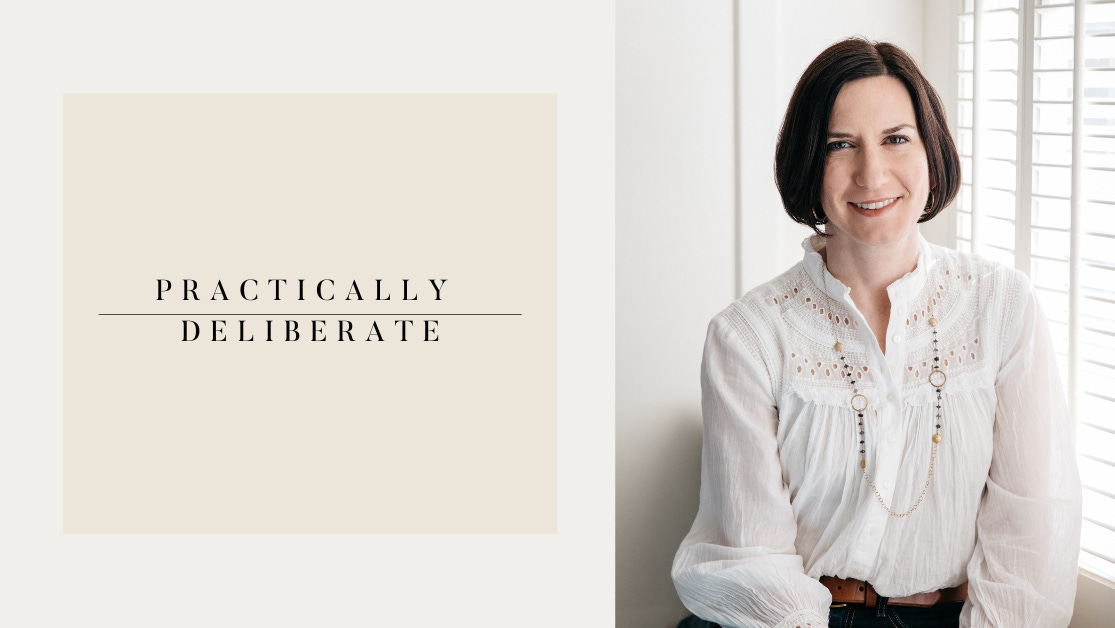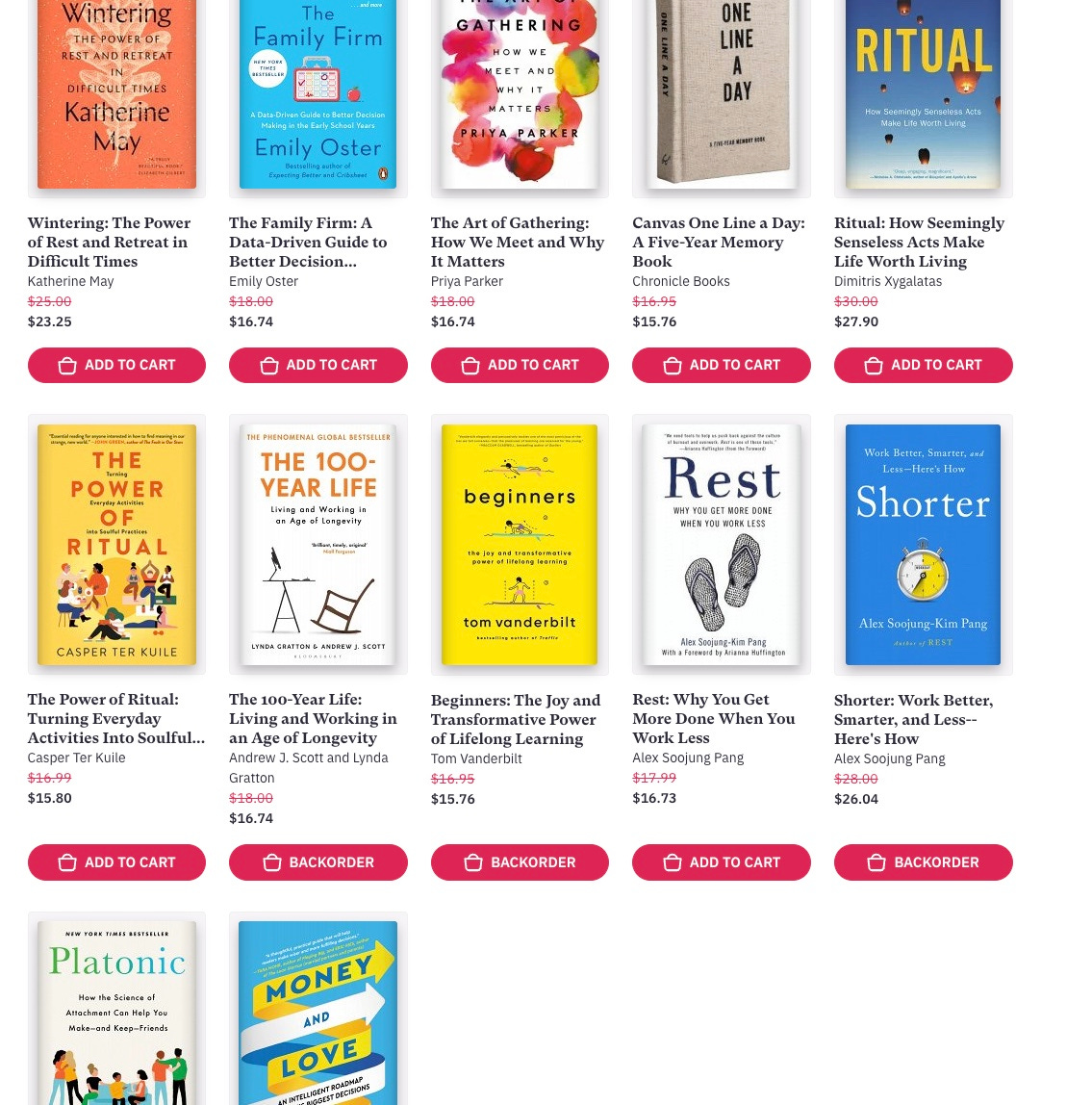Wintering is Part of My Business Plan
And why you might want to build this idea into your own life
Sometime during the last few months, I slipped into a season of grief.
It happened, to borrow a phrase from Hemingway, gradually and then suddenly.
My mother’s “Deathday” (which we commemorate, Harry Potter-style) is in early October. As we’ve done for the past three years, my family gathered with my father in the cemetery where she’s buried. We shared memories of her, placed brightly-colored origami paper cranes on her gravestone, and then went out for sushi.
As in years past, it was hard, as I expected it to be. But unlike in years past, my sadness didn’t go away afterwards. It lingered, sidling up to me at unexpected times and in unexpected places. It wasn’t debilitating - I still worked, attended my weekly tennis class, and even sent out holiday cards - but I’ve gone through an entire box of tissues in my weekly therapy sessions, after a long stretch of not doing that.
I realize grief is not linear, and I’m familiar with the ball and the box analogy, but I wondered why grief was showing up in such a big way now. Yes, awful things are happening in the world. But it didn’t seem to be just that. And then I realized: this is the first time since my mom passed away in October 2020 that I don’t have a big project (and the accompanying adrenaline) carrying me through the final months of the year.
In 2020 it was successfully pitching our book to publishers and conducting new book research. 2021, it was finishing the manuscript, negotiating a leave of absence from my full-time job, and figuring out a path forward when that leave wasn’t granted. In 2022, it was helping my older son adjust to a new school, setting up a newly-rented office space, and launching the book. Now, the book is out, my business and my office are set up, and my younger son is comfortably ensconced in the same school. So grief tapped me on the shoulder. “Remember me?” it said. “I’m still here.”
This time of year is challenging
I’m not the only one feeling big feelings during these last few “-ber” months. It’s not a coincidence that several writers I admire have recently explored feeling overwhelmed and burnt out or offered solutions for feeling overwhelmed and burnt out in their newsletters.
of wrote candidly about her emotional rollercoaster; of shared her strategy of intentional mediocrity; and of The Double Shift discussed “the season of dramatically lowering your expectations.” Even without grief added to the mix, the consensus is: these months of non-stop holiday-ing are a lot.For many people in traditional office jobs (even if they’re still doing them remotely), this is also the time of writing and conducting performance reviews and of 2024 budget and goal-setting, which - no matter how much you love what you do - are never anyone’s favorite work activities.
While I no longer do performance reviews, as an entrepreneur, I certainly feel pressure to plan for 2024. I recently received an invitation from a business coach to a goal-setting workshop designed “to help corporate leaders-turned-entrepreneurs replace their six-figure salaries.” Intrigued, I checked the dates: December 15 and 18. And I seriously considered registering, I really did. But I couldn’t bring myself to do it.
Instead, I picked up a book I’d read before and felt compelled to return to: Katherine May’s Wintering: The Power of Rest and Retreat in Difficult Times. It’s beautiful and poetic, and I’ve included several long quotes from her book in this post to give you a sense of how lyrical her writing is. It, along with the other books I’ve mentioned in this newsletter, is available on my Bookshop.org recommended reading list (the button below will take you there). [Note: when you purchase books from my affiliate link, I get a small referral fee, which I use to purchase more books.]
Wintering is both a state of being and an approach to life
May’s book is a first-person account of her own wintering and a guidebook for how to winter. Here’s how May describes the concept:
Wintering is a season in the cold. It is a fallow period in life when you’re cut off from the world, feeling rejected, sidelined, blocked from progress, or cast into the role of an outsider. Perhaps it results from an illness or a life event such as a bereavement or the birth of a child; perhaps it comes from a humiliation or failure. Perhaps you’re in a period of transition and have temporarily fallen between two worlds….However it arrives, wintering is usually involuntary, lonely, and deeply painful.1
May’s personal wintering is prompted by her husband’s unexpected illness, her young son’s unhappiness and subsequent withdrawal from school, and her own health challenges that cause her to resign from her job. In the book, she chronicles her experience and offers insights from literature, mythology, and nature for how we can “care for and repair ourselves when life knocks us down.”
Here are three lessons from May’s book that I’m adopting in my season of grief.
Lesson one: pay attention to your feelings, especially sadness.
May notes that actively accepting feelings of sadness is the first step to healing (even though we are socialized to push away these feelings). As she describes:
Perhaps through all those years at school, or perhaps through other terrors, we are taught to ignore sadness, to stuff it down our satchels and pretend it isn’t there. As adults, we often have to learn to hear the clarity of its call. That is wintering. It is the active acceptance of sadness. It is the practice of allowing ourselves to feel it as a need. It is the courage to stare down the worst parts of our experience and to commit to healing them the best we can. Wintering is a moment of intuition, our true needs felt keenly as a knife.2
I was fortunate to have an existing relationship with a trusted therapist when my grief showed up in full force. We’ve talked a lot recently about the big life transitions I’ve navigated without my mother’s support - both in the last three years since she died and in the nine years before that, after a traumatic brain injury left her much changed from the person who raised me. Having a safe space to stare down my sadness has been crucial (as has having many boxes of tissues on hand).

Lesson two: nature can teach us how to survive difficult times
In Wintering, May describes the strategies that plants and animals adopt to get through the winter months. From trees to dormice to bees, there are lessons to be gleaned in how the natural world survives a fallow period. In May’s words:
Nature shows that survival is a practice. Sometimes it flourishes – lays on fat, garlands itself in leaves, makes abundant honey – and sometimes it pares back to the very basics of existence in order to keep living. It doesn’t do this once, resentfully, assuming that one day it will get things right and everything will smooth out. It winters in cycles, again and again, forever and ever. It attends to this work each and every day. For plants and animals, winter is part of the job. The same is true for humans.3
The cyclical design of nature normalizes periods of abundance and scarcity; in other words, they’re a feature, not a bug. The idea of paring back to the “the very basics of existence” especially resonates with me. My friend
wrote about the power of subtracting in this week’s issue of her newsletter,. I’m exploring what to subtract from my existence during this time, and even just asking the question feels good.
Lesson three: treat yourself like a favored child
At the end of Wintering, May acknowledges that it is a different book than the one she set out to write because of the winter she endured while writing it. She credits the fact the book exists at all to her own past experience wintering and the strategies she’s learned as a result. As she describes:
I recognised winter. I saw it coming (a mile off, since you ask), and I looked it in the eye. I greeted it and let it in. I had some tricks up my sleeve, you see. I’ve learned them the hard way. When I started to feel the drag of winter, I began to treat myself like a favoured child: with kindness and love. I assumed my needs were reasonable and that my feelings were signals of something important. I kept myself well fed and made sure I was getting enough sleep. I took myself for walks in the fresh air and spent time doing things that soothed me. I asked myself: What is this winter all about? I asked myself: What change is coming?
This lesson is the hardest for me to internalize. While I’m quick to respond when one of my children requires soothing, I’m not so quick to accommodate my own needs (I’ve joked that I’m my most demanding boss). If you, too, find it hard to be gentle with yourself and are used to pushing through tough times, I see you.
When I mentioned May’s book and the concept of wintering in a therapy session, my therapist wisely suggested that I consider “making wintering part of my business plan.” I loved that phrasing and have decided to embrace the concept of deliberate wintering. May says that wintering is usually involuntary, but I’m attempting the voluntary version.
By doing that, I’m following Alex Pang’s advice (discussed in the first issue of this newsletter): viewing deliberate rest as work’s ally instead of as work’s adversary.
Past Abby would have muscled through her grief. But past Abby also got shingles before she turned 40. So I’m trying something different. Instead of the goal-setting workshop, I signed up for a meditation retreat. I’ve cleared my calendar when a beloved cousin and her husband will be in town. I’m looking winter in the eye, welcoming it, and inviting it in. I’m asking myself what I need, and I’m making myself pause before I answer.
Abby’s Latest
May has a clear point of view about what hobbies and activities pair well with wintering. Here’s what she has to say:
Winter is a time for the quiet arts of making, for knitting and sewing, baking and simmering, repairing and restoring our homes.
In the high summer, we want to be outside and active; in winter, we are called inside, and here we attend to all the detritus of the summer months, when we were too busy to make the necessary care. Winter is when I reorganise my bookshelves and read all the books I acquired in the previous year and failed to actually read…Winter is a time for libraries, the muffled quiet of bookstacks and the scent of old pages and dust. In winter, I can spend hours in silent pursuit of a half-understood concept or a detail of history. There is nowhere else to be, after all.4
I’m delighted to share a course offering (with a discount for Practically Deliberate readers!) that is perfectly aligned with wintering.
Allison Busch Zulawski is the talent behind Allison Busch Photography. She took our family photos for many years, and I’ve always admired her approach as well as the beautiful photographs she takes.
In January, Allison is teaching a two-week intensive online course called Artful Parenthood that will help you go from feeling like you lack the time, skills, and creativity to artfully document your family to feeling confident and inspired as you become your family’s storyteller.
She’s giving Practically Deliberate readers a 10% discount (if you click here, the discount should be reflected and applied). Don’t delay; registration closes on Monday, December 18 (though the course itself runs from January 15-28, 2024).
Deliberately yours,
Abby
Money and Love makes a great holiday gift! For personalized copies: buy from Booksmith (share personalization requests in the comments section at checkout). For the budget conscious: save more than 30% off the cover price on Amazon right now. Other options here.
May, Katherine. Wintering: The Power of Rest and Retreat in Difficult Times. (New York: Riverhead Books, 2020), pp. 10-11.
Ibid, pp. 119-120.
Ibid, p. 238.
Ibid, p. 210.





Oh, if only were possible! Please see my latest piece on Gotham Girl
https://alisajones.substack.com/p/shes-ferel-on-purpose-how-to-set
And The Empress on The Myth of "Rest" and "Wintering" in America
https://alisakennedyjones.substack.com/p/wise-af-wednesdays-the-virtual-laufey
Today is going to be a super hilarious scene with me trying to use ASL and "Love Actually" cue cards on my gangster heavy SF landlord. 😂 Still adore your book!